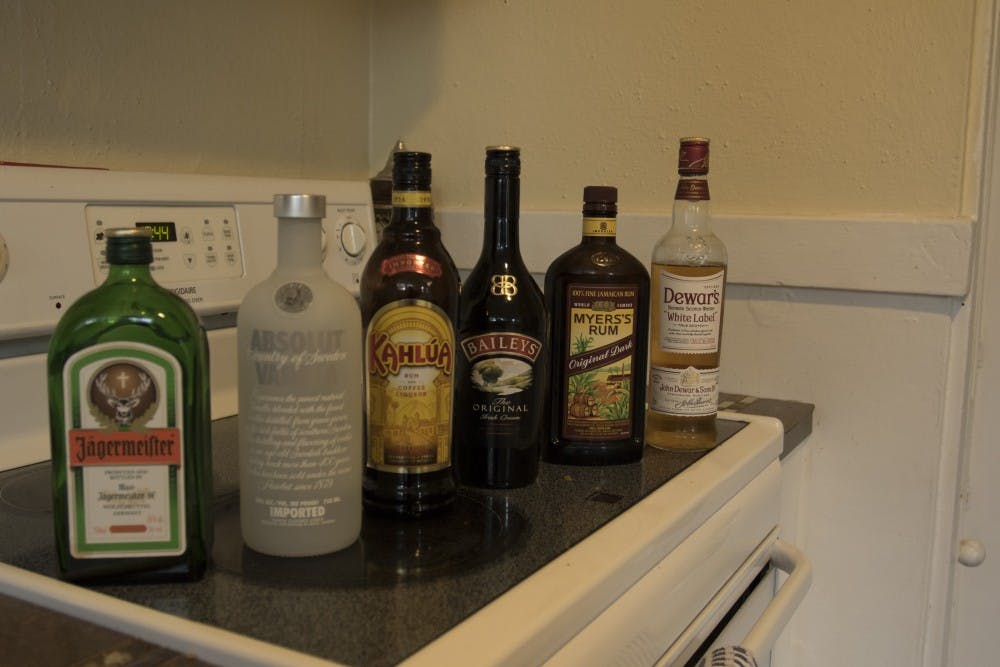by Cheyenne Schoen |
Whether it’s losing control of our steps or losing our pre-party meal, many of us have seen alcohol’s immediate effects take a toll on ourselves and on our friends. A pounding headache and a weak stomach are a few things we might face the morning after a night out, but what are some of alcohol’s lesser-known effects on the brain and body that we don’t immediately see?
The National Institute of Alcohol Abuse and Alcoholism defines binge drinking as, “a pattern of drinking that brings blood alcohol concentration (BAC) levels to 0.08 g/dL. This typically occurs after four drinks for women and five drinks for men — in about two hours.” A national survey done by the Substance Abuse and Mental Health Services Administration revealed that 60 percent of college students ages 18-22 drank alcohol in the past month, and 2 out of 3 of them did so by binge drinking.
Psychology and neuroscience professor Mark Pitzer warns against the effects of binge drinking on the brain. Unlike other drugs, he said, alcohol penetrates all tissues in the body because it is lipophilic, meaning it dissolves quickly into lipids and fats.
“Alcohol seems to greatly enhance how GABA neurotransmitters work, so it is inhibitory,” Pitzer said. “The first brain cells that seem to be involved are in the cerebellum, so the speech goes, becomes slurred, then you have some movement problems, and then everything else goes, including all of the brain tissues.”
According to Pitzer, the hippocampus is the next part of the brain affected by binge drinking. The hippocampus is the brain’s memory maker. Drinking a lot in a short amount of time disables the brain’s ability to encode or record memory, which can lead to a memory blackout.
[graphiq id="fV3dCm3pad" title="Binge Drinking Prevalence by State" width="400" height="576" url="https://w.graphiq.com/w/fV3dCm3pad" link="http://conditions.healthgrove.com" link_text="Binge Drinking Prevalence by State | HealthGrove"]
Junior environmental science major Marc Dorsey said it’s interesting that we are sometimes able to recall partial memories, which he calls a “brownout.”
“You can have a blackout, where you don’t remember anything, or a brownout, where you remember bits and pieces, or right before you blacked out or right after,” Dorsey said. “With a blackout, it’s interesting that you can recall when you blacked out, the last memory before, but then after that it’s just nothing. I’d be interested to know what happens biologically during a blackout.”
Pitzer has an answer.
“As those doses of alcohol continue up, you continue to alter brain activity, and the blackouts come about because you have changes in the activity in the hippocampus,” Pitzer said.
Alcohol’s effects extend beyond the brain. The liver works to get rid of toxins in your body, and that includes alcohol. The liver makes a toxin during the metabolization process of alcohol that is even more harmful than the alcohol it is breaking down, and these toxins can damage the liver’s cells and other organs.
“The liver and the muscle tissue kick out their enzymes, alcohol dehydrogenase, which can break down alcohol, but they are overwhelmed, and there’s just no way they can keep up,” Pitzer said.
Pitzer explained that the danger with binge drinking is in the reward circuits that come with it, because those reward circuits may lead to withdrawals and later to addiction.
“The reward circuits that evolved to bring reinforcement when you’re around people, or a certain person, or food when you’re hungry, are totally overwhelmed by any drug, including alcohol,” Pitzer said. “If they’re pushed too hard by huge doses three or five times a week, you can have changes to where the brain functions differently and you have withdrawal symptoms when you don’t have alcohol.”
Withdrawal symptoms are dangerous, he said, because college students are in the middle of the risk factor for addictive behaviors, which ranges from ages 15 to 25.
“Binge drinking is a sledgehammer that has a high probability of changing the brain,” Pitzer said. “The brain has just never evolved for that. The brain evolved for getting scared, but that goes away really quickly. Or, you know, ‘I found this big cheeseburger in the forest and that was great!’ But that feeling goes away, and wanting Jägermeister doesn’t.”
And have you ever noticed yourself getting sick after a weekend of drinking? That’s probably because alcohol suppresses your immune system’s ability to fight off germs for 24 hours after you’ve gotten drunk.
Putting down the bottle and drinking in moderation can eliminate or reduce the harmful effects of alcohol on the body and brain. Moderate drinking, according to the NIAAA, is up to one drink per day for women and two drinks per day for men.
Cheyenne Schoen is a reporter at The Beacon. She can be reached at schoen17@up.edu.








